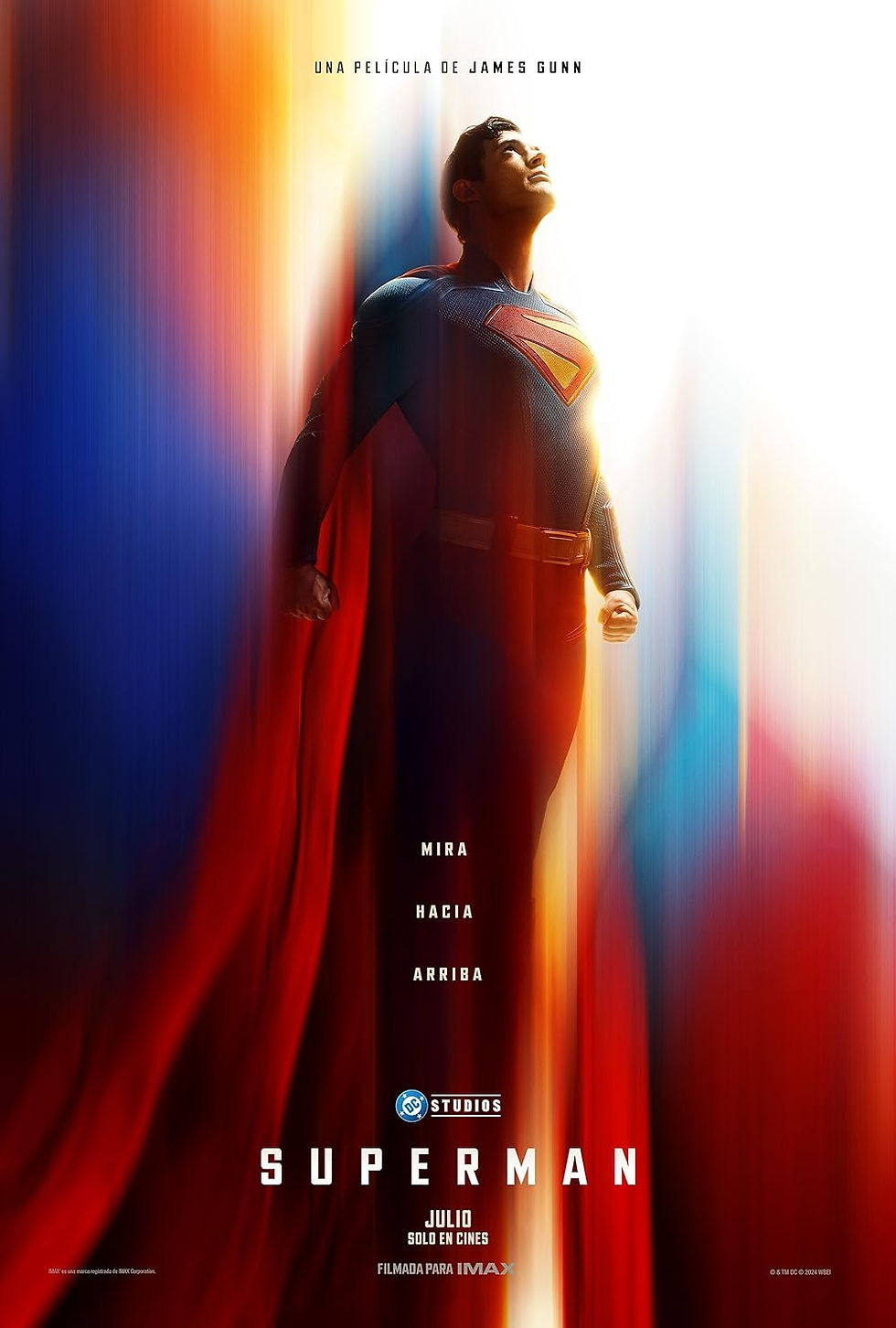Superman
- Young Critic

- Jul 18, 2025
- 3 min read
Updated: Sep 10, 2025
DC’s reboot buckles under bloated world-building and thin storytelling

The DC comic book adaptations have been a mixed bag at best for Warner Bros. studios. They began with a significant advantage over Marvel, kickstarting the superhero genre with Superman: The Movie (1978) and Batman (1989). Yet over the past decade and a half, Marvel has been eating their lunch—despite arguably having a weaker roster of characters (Marvel doesn’t even have direct rights to some of their most famous, like Spider-Man or the Hulk). DC’s attempt to create a shared cinematic universe fizzled out a few years ago, forcing the studio back to the drawing board. In response, they’ve poached James Gunn—who helmed the Guardians of the Galaxy films for Marvel—to lead their new DC Studios and oversee a revamped extended universe. The first film in this second attempt to reach Marvel’s heights is Superman (2025).
Superman drops us into a world where metahumans (superheroes) have coexisted with humans for centuries. The alien from Krypton—Superman, aka Clark Kent (David Corenswet)—is already a known figure. He has an established enemy in corporate arms dealer Lex Luthor (Nicholas Hoult), and a relationship with his Daily Planet colleague, journalist Lois Lane (Rachel Brosnahan). Whether Luthor can dent Superman’s credibility and status as a symbol of good unfolds from there.
James Gunn wears multiple hats as DC’s studio head, the film’s director, and screenwriter. It’s an ambitious workload that unfortunately leaves him overstretched. Much like with Spider-Man, Superman’s origin is so deeply embedded in pop culture that rehashing it would be redundant. As with Spider-Man: Homecoming (2017), Gunn wisely assumes audiences know the basics and begins the story midstream. However, he takes this too far, opening with a long-winded expository paragraph that attempts to explain a fictional geopolitical conflict (heavily referencing Israel-Palestine), the history of metahumans, Superman’s current place in the world, and even the aftermath of a battle we never saw. The lesson of “show, don’t tell” seems to have gone completely over Gunn’s head.
There are effective ways to begin a story in the middle of a conflict. Screenwriting principles even suggest starting scenes mid-conversation to create a natural rhythm. But Gunn pushes this approach to an extreme, resulting in a confusing and messy narrative.
Much of this chaos stems from Gunn’s dual role as filmmaker and DC Studios executive. Superman isn’t just meant to reintroduce its titular hero—it’s also a launchpad for a sprawling universe. As a result, the film spends more time teasing future storylines, superteams, alien species, Krypto the Superdog, fictional nations, and alternate dimensions than it does focusing on Clark Kent himself. Gunn is too distracted by the big picture to focus on the story he’s currently telling.
Structurally, it also feels like the entire first act is missing. At the heart of Superman is supposed to be a story about identity—Clark’s dual existence as alien and human. Yet we’re given next to nothing about his upbringing, his parents, or his internal struggle to balance the two halves of himself. These are the very tensions that ground a Superman film, especially a reintroduction. Instead, Gunn shuffles us through CGI-heavy landscapes, from one generic fight to the next.
Without proper emotional grounding, the stakes fall flat. We’re expected to care about Lois and Clark, and hate Lex, based purely on cultural memory. This reliance on audience familiarity is lazy, and it undermines potentially emotional moments. Scenes that could have been moving are instead met with indifference. We aren’t given time to fall in love with Lois and Clark. Lex’s motivations are reduced to a shallow aside, and Superman’s internal conflict is barely explored.
What’s most frustrating is that the ingredients for a great Superman film are present. The casting is outstanding. Corenswet threads the needle between Christopher Reeve’s warmth and Henry Cavill’s stoicism. Brosnahan, in her limited screen time, channels the fearless spirit of Lois Lane. Even smaller roles—like Skyler Gisondo as Jimmy Olsen—are engaging and well-performed. The costume and creature design are colorful and creative. And while there’s an overwhelming amount of greenscreen and CGI, the visual artists bring distinctive flair to their work. Unfortunately, with eight different storylines crammed into one, even the best cogs can jam the machine instead of powering it.
In the end, Superman is yet another chaotic misfire in DC’s attempt to reboot its cinematic universe. Under Gunn’s leadership, the studio appears to be repeating the same mistakes as its predecessors: overstuffing films with characters and mythology in a desperate bid to catch up to Marvel, while neglecting the core storytelling that makes these heroes matter. Superman is too bogged down by corporate ambitions to function as a compelling film in its own right. The overstuffed narrative, awkward editing, and absence of a true first act result in a well-intentioned but incoherent mess.
4.7/10








wowww love your reviews, king